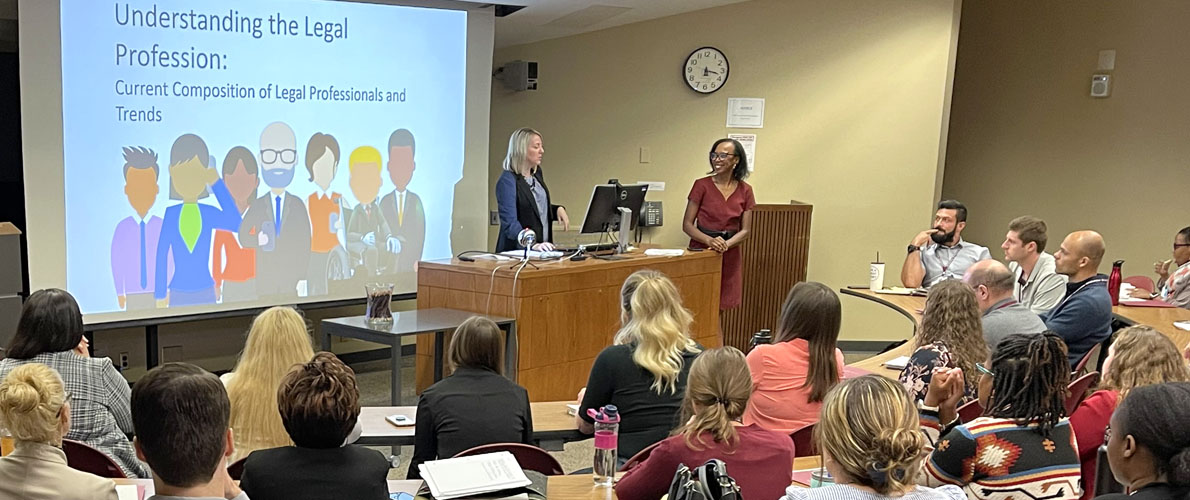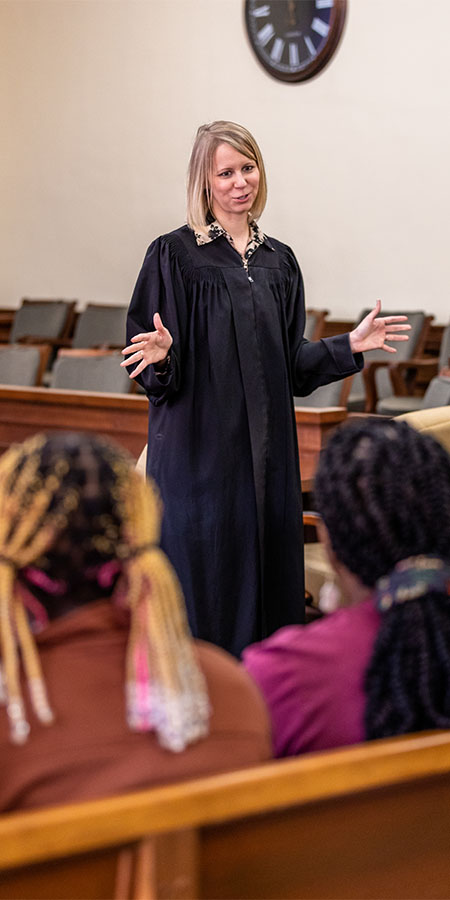- Doctor of Medicine
Students seeking to enroll in the M.D./J.D. program are required to meet the admission standards established separately by the Simmons Law School and the School of Medicine. Application to each of these schools is an independent process and students must ensure timely completion and submission of separate applications to the School of Medicine and the Simmons Law School. Admitted students will fill a limited number of places available in the dual degree program. To be competitive, applicants to the School of Medicine should present better than a B grade point average and competitive MCAT scores. Law school applicants generally should present better than a B grade point average and a competitive LSAT score. Interested students should request application materials from the Director of Admissions (School of Medicine) and Director of Admissions (Simmons Law School). Out-of-state applicants are encouraged to apply.
The M.D./J.D. program requires students to spend their first year at the Simmons Law School in Carbondale, where they will complete 31 credit hours of prescribed first-year course work. Students then will enroll in the law school summer session and complete six credit hours of advanced course work. During the second academic year, students will continue in Carbondale as full-time law students completing an additional 33 credit hours of course work. This course work includes the second and third-year required law courses and elective courses with a concentration in health law.
Enrollment in a second summer session will be required, during which time students will complete six credit hours of course work. This session may include legal research and clinical experience in state or federal agencies involved in the regulation of public health and the activities of the medical profession. Students will spend their third academic year enrolled as freshmen in the School of Medicine in Carbondale, where they will complete all requirements of the first year of the medical school curriculum. Students then will move to Springfield, where they will continue as full-time medical students, completing the sophomore and junior years of the curriculum.
During the senior year of medical school, students will be required to take a specially designed set of law, medicine, and health policy electives lasting 14 week, full-time. In completing degree requirements for both the M.D. and J.D. degrees, this 14-week elective sequence will serve to fulfill 14 credit hours of course work required for attainment of the J.D. degree and 14 weeks of elective course work required for attainment of the M.D. degree.
Read more about the requirements for MD admission from the SIU School of Medicine.
- Doctor of Political Science
Juris Doctor and Ph.D in Political Science Program
- Master of Accountancy
During the first academic year of concurrent work on the two degrees, the J.D./M.Acc. student enrolls only in the first-year law curriculum. Students must pass all required courses which currently consist of all first-year courses, Constitutional Law: Powers of Government, Civil Procedure II, Business Organizations, Constitutional Law: Individual Rights, Criminal Procedure: Pre-Trial, Evidence, Legal Profession, and a Senior Writing Requirement. Thereafter, the student may enroll for courses in the Simmons Law School or in the School of Accountancy.
Students entering the J.D./M.Acc. concurrent degree program without the necessary foundation courses in the common body of knowledge of business and administration as specified by the American Assembly of Collegiate Schools of Business must complete them in a satisfactory manner. Students may have prior course work evaluated for satisfaction of foundation requirements.
- Master of Health Administration
Healthcare remains one of the most heavily regulated industries, which creates substantial opportunities for health lawyers. The concurrent J.D./M.H.A. degree program prepares students for positions related to litigation, advisement, regulation, advocacy, transactions, and administration across the healthcare spectrum, such as hospital systems, insurers, pharmaceutical companies, government agencies, and health policy organizations.
Students must be admitted separately to the Health Administration program and the Simmons Law School. During the first academic year, students enroll only in the first-year law curriculum. In any subsequent academic term, the student may enroll for courses in the Simmons Law School and/or in the MHA program.
When completed separately, the J.D. degree requires completion of 90 semester hours of coursework and the M.H.A. degree requires completion of 42 semester hours of coursework. However, in the J.D./M.H.A. concurrent degree program, the Simmons Law School accepts nine semester hours of health administration coursework toward meeting the J.D. semester hour requirement and the College of Health and Human Sciences accepts nine semester hours of law toward meeting the M.H.A. semester hour requirement. This allows students in the concurrent degree program to complete 81 semester hours of law courses and 33 semester hours of health administration courses, saving 18 credit hours.
Students interested in pursuing this concurrent degree are encouraged to have a background in a health-related area.
- Master of Electrical and Computer Engineering
Southern Illinois University Carbondale is one of the few institutions in the country to offer a concurrent degree in Electrical and Computer Engineering and Law. Students prepared for this program are expected to possess an undergraduate degree in electrical engineering, computer engineering or related field. Students are able to tailor their program of study to focus on legal principles and policies involving the engineering profession including patent, copyright, trademark, environmental and electronic commerce laws, federal regulation of electronic media and other engineering-related areas of law.
Curriculum
The THESIS course of study consists of the following:
- 12 hours of 500-level ECE courses
- 6 hours of ECE 599 Master’s Thesis
- 3 hours of ECE 592 Special Investigations
- 81 hours of LAW courses, which must include 9 hours from an approved list
The nine hours of ECE 599 and ECE 592 are applied toward the J.D. degree, for a total of 90 hours. The nine hours of LAW courses from the approved list are applied toward the M.S. degree in ECE, for a total of 30 hours
The Non-THESIS course of study consists of the following:
- 15 hours of 500-level ECE courses
- 3 hours of ECE 592 Special Investigations
- 3 hours of ECE 593 Advanced Topics
- 81 hours of LAW courses, which must include 9 hours from an approved list
Nine hours of ECE courses, including ECE 592 and ECE 593 are applied toward the J.D. degree, for a total of 90 hours. The nine hours of LAW courses from the approved list are applied toward the M.S. in ECE, for a total of 30 hours.
Admission
Students must meet the requirements of admission and be admitted separately to the Master of Science program in Electrical and Computer Engineering and the Simmons Law School. Accepted students could complete the concurrent program in as few as three years, including summers. Law students interested in this program should consult with the Simmons Law School Associate Dean for Academic Affairs and with the Chair of the Department of Electrical and Computer Engineering.
- Master of Science in Education
The Department of Educational Administration and Higher Education (EAHE) is partnering with the Simmons Law School to offer a concurrent Master of Science in Education (M.S. Ed.) degree along with the Juris Doctorate (J.D.) degree. This program provides the opportunity to supplement a traditional legal education with the experience of school administration at the elementary and secondary level.
Students in this concurrent degree program will be uniquely prepared for careers that combine both legal and education needs, such as k-12 administration, public policy leadership roles, and student or employee advocate. Finally, students with this concurrent degree will be prepared to address the myriad of societal that present complex legal and educational issues. Students who complete this program will have enhanced educational and professional opportunities both inside and outside of academia.
- Master of Social Work
The concurrent J.D./M.S.W degree program is designed to educate practitioners in law and social work to effectively utilize the problem-solving strategies and techniques of both disciplines. Students prepared in this program will develop an understanding of the ethics, language, research, history, and processes of both professions. Individuals so trained will be uniquely prepared for careers which combine both legal and human service needs such as administration, supervision of the provision of services, public policy leadership roles, family practice, and community planning and development. Students with this concurrent degree will be uniquely prepared to address the myriad of problems in our society which present complex legal and social issues.
Social Work offers two tracks for the M.S.W. degree. Track One is a two-year track requiring 60 hours of credit. Track One is generally undertaken by those students whose undergraduate degree is in a field other than social work. Track Two consists of a 39-hour credit requirement and is capable of being completed in one summer and one academic year. Track Two is available to selected students who have an undergraduate degree in social work from an accredited social work program.
The concurrent program would combine requirements to enable students to receive the two degrees simultaneously with a minimum requirement of 81 hours in law and 51 hours in social work (in the 60-hour track) or 33 hours of social work (in the 39-hour track).




